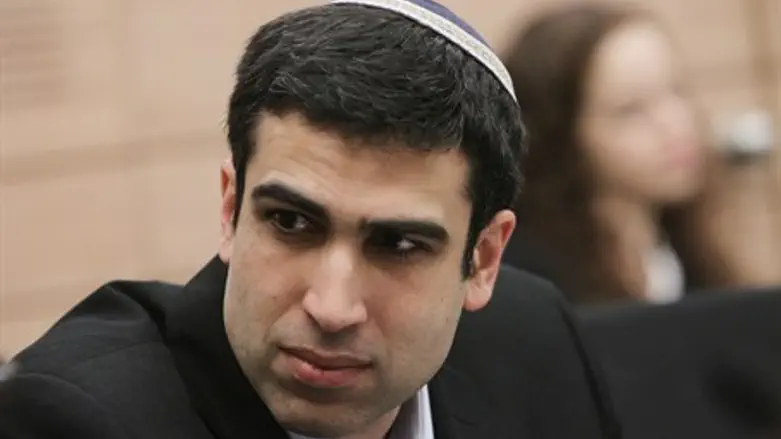
MK Yoni Chetboun (Bayit Yehudi), speaking in Jerusalem before a visiting delegation from the European Parliament, said the time has come to find alternatives to the "two state solution."
Chetboun, who currently is on the Foreign Affairs and Defense Committee, told the delegation "it is time to break out of paradigms that have demonstrably failed."
As an alternative to the "two state solution," whereby a Palestinian state would be created in Judea and Samaria, Chetboun presented the declaration of Israeli sovereignty over the area as "the only way to guarantee coexistence."
Regarding the large number of Arabs currently in Judea and Samaria, who many suggest pose a demographic threat, the MK suggested a "reciprocal process which resolves the strategic concerns of Israel, while providing the Arab residents with rights, and eventually representation in the Knesset."
As part of his questioning of the current political paradigms and alignments, Chetboun made a statement last Thursday calling for a break in the alliance between his party and MK Yair Lapid's Yesh Atid, with differences on the national agenda being a large factor.
On Tuesday Lapid said Jerusalem is not up for negotiation in the peace talks, but reiterated that he supports the "two state solution" whereby a PA state would be created in the heart of Israel.
Chetboun's statements today come amid various calls for the need to suggest policy alternatives to the failed "two state solution."
Deputy Foreign Minister MK Ze'ev Elkin (Likud) said in an October interview with Sovereignty, a new journal by the Women in Green movement, that while the Right has invested energy in "practical Zionism" by building in Judea and Samaria, it has made a grave error in leaving statesmanship to the Left.
Two recent Jerusalem conferences have attempted to advance new paradigms.
The "One State for One People" conference in early October called for the immediate annexation of Judea and Samaria despite the area's large Arab population.
Meanwhile in August, a conference entitled "Two States for Two Peoples on Two Sides of the Jordan River" was held, calling for an alternative plan by which Palestinian statehood could be realized in Jordan.
In Jordan 60-80% identify as Palestinian, with many anticipating that the country will soon become a Palestinian state. Furthermore it was noted at the conference that the vast majority of Arabs in Judea and Samaria already hold Jordanian citizenship.
Former MK Professor Aryeh Eldad, director of the group which organized the conference, Professors for a Strong Israel, said he wanted to show that there is a "third way" to solve the conflict and get away from the failed paradigm of creating an Arab state in Israel.